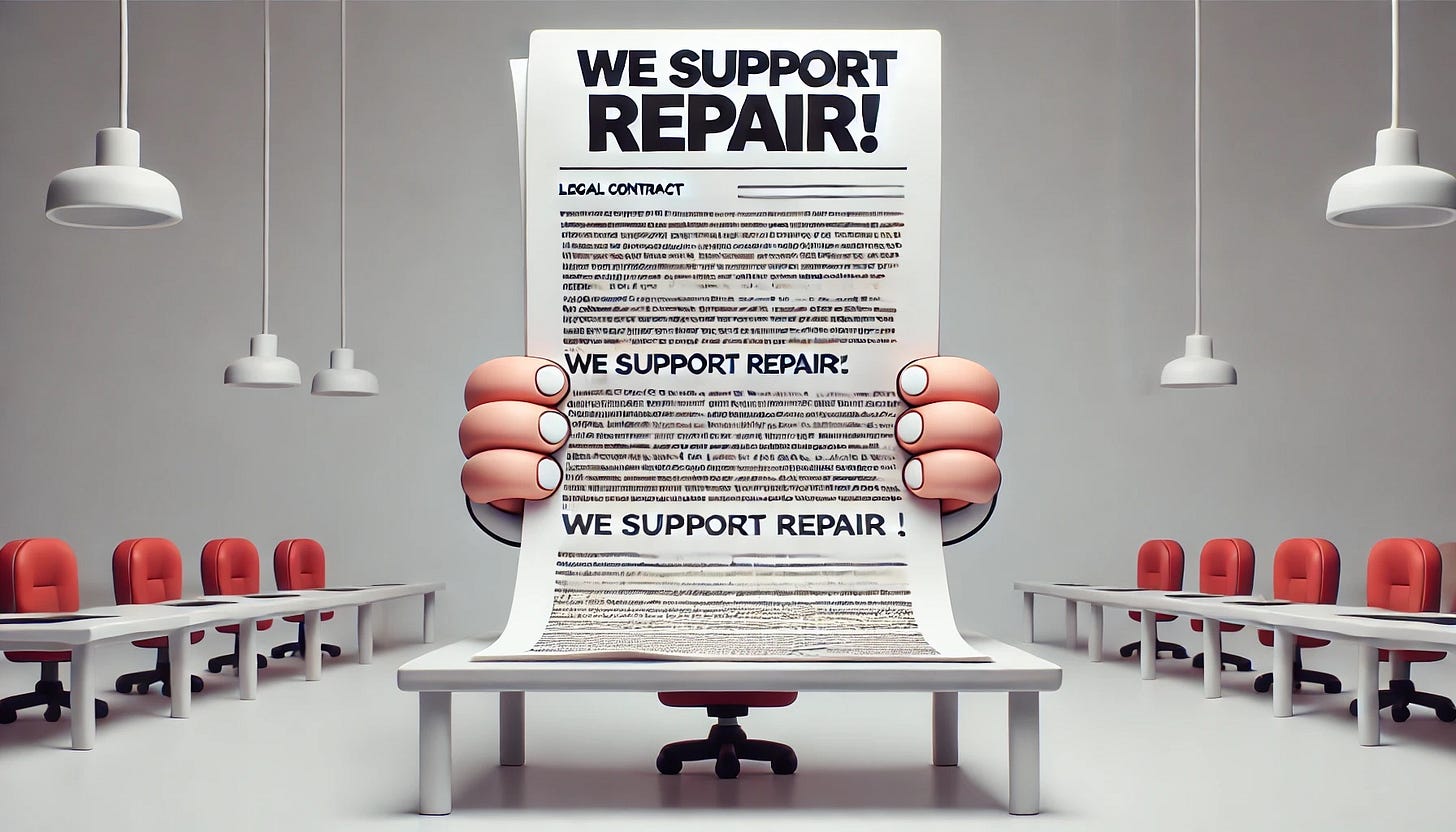Is a Company "Pro Repair"? Read the Small Print!
Does making a phone slightly more repairable make a company pro-repair? Also: farmers still calling for national repair law. Also: one of the last RadioShacks is closing down in Maine.
This week, two products from Samsung received positive press for their increased repairability. The Galaxy Z Flip 6 and the Galaxy Buds 3 both improved their repairability according to various tech news outlets, prompting praise and admiration for a company trying to make its products last longer.
The Flip 6 is an improvement on its predecessor, the Flip 5. And the new ear buds from Samsung are being directly called out as the more repairable version of the notoriously unrepairable Apple AirPods.
But the Samsung “story” on repair is more complicated than a few marginal improvements to brand new products. News about more repairable products come out every day, but this focus on individual products tends to miss the forest for the trees: a company can both design more repairable devices and still make it harder to repair them.
“Pro-repair” companies can restrict repair
Oil companies like ExxonMobil claim to care about promoting sustainability, but that doesn’t mean you’d be right to call them “sustainable.” The right to repair is no different: the bar measuring support of “right to repair” changes depending on the company you are discussing. And for a company that produces tens of millions of personal electronic devices annually, like Samsung, the bar to clear for supporting right to repair is high.
Does making a slightly more repairable phone make a company supportive of repair? If so, Apple can be said to be a right-to-repair supporter. After all: it’s making conscious choices to make its products more repairable. Yet Apple continues to pursue bigger, longer term strategies that add friction to the repair process and greatly discourage repair over replacement. Those range from it’s frustrating online tools to repair unfriendly device designs, to practices like parts pairing, and activation locks.
Which begs the question(s): ‘What if a company has a repairable phone, but they don’t offer long-term software supports which degrades their phones longevity?’ Or ‘what if a company offers long-term software supports but their devices aren’t repairable?’
Clearly: a singular decision or product does not make a company “pro-repair” in the same away that a company using recycled plastic in a product doesn’t make them “sustainable.”
The Ballad of Samsung and iFixit
That’s the clear message you’ll get when you dig into Android Authority’s C Scott Brown latest article, an interview with iFixit’s Kyle Wiens, in which he unpacks the failed partnership between Samsung and iFixit, illustrating the pitfalls of branding companies as “pro-repair.”
The interview traces the long and complicated history between the two companies - starting with Samsung’s promised Galaxy Upcycling program, in which it floated plans to offer ways for old Samsung devices to be repurposed using different software, and continuing to the company’s latest partnership with iFixit to sell replacement parts for Android phones and tablets.
As we know, the company made a number of ill conceived choices that forced iFixit to walk away from the agreement. Those included exorbitant prices for OEM parts, caps on the number of parts that 3rd party repairers could purchase, and requiring that parts be bought together. In the end, the stated goal of making Samsung phones more widely repairable was not something iFixit felt could work through the partnership.
Still, for Samsung, the partnership with iFixit served its purpose: drawing a flood of headlines and positive coverage when it was announced and boosting its image as an electronics maker focused on sustainability by trying to make its electronics last longer. But Brown notes that the reality of “pro-repair” companies is more fraught than headlines suggest. Actions - not press releases - are the measure of a company’s commitment to the right to repair, while letting corporate PR departments shape how we think about them is a sure way to let anti-repair measures slip through the cracks.
Right to Repair, eh?
Do you live in Canada? If so, the government wants to hear your thoughts on a right to repair. The Canadian government is accepting online submissions for a consultation on a right to repair policy for home appliances and consumer electronics through September 26, 2024. The purpose is to gather feedback from Canadians to inform policy direction and improve Canadians’ ability to repair consumer products such as major appliances, small household appliances, and consumer electronics like cell phones and computers- part of a broader effort by the federal government to reduce harmful electronic waste and ensure Canadians can keep their devices working longer.
Comments and feedback can be provided through the survey questionnaire, or alternatively, you can email your comments and feedback to: isrighttorepair-ledroitalareparationsi@ised-isde.gc.ca
Other News
Farmers tell FTC Legal Enforcement Not Enough, Right to Repair Needed
At a roundtable in Longmont, Colorado farmers shared their struggles with equipment repairs due to dealer consolidation and limited access to parts and mechanics. And despite commitments and press from farming companies about making repair more accessible, farmers are stressing the need for federal right-to-repair legislation. U.S. Sen. John Hickenlooper and U.S. Rep. Joe Neguse, both Democrats, joined FTC Chair Lina Khan in listening to the farmers' concerns, emphasizing the importance of such legislation to support agricultural productivity and competition.
One of the last Radio Shacks just closed in Maine
Senators call on FTC to investigate car companies’ data collection
Two U.S. Senators: Ron Wyden a Democrat from Oregon, and Edward Markey, a Democrat from Massachusetts, are calling on the Federal Trade Commission (FTC) to investigate how car companies collect data with an eye to identifying violations of federal law. In a July 26 letter to FTC Chair Lina Khan, Wyden and Markey called on the FTC to get to the bottom of automakers data harvesting activities. Recent reports have highlighted lax practices. Those include the Mozilla Foundation’s September, 2023, analysis of more than two dozen automakers that declared cars the “worst product category we have ever reviewed for privacy.”
TechCrunch: Back Market’s Bustling Hub for buying Used Tech
Letter calls on FCC to clamp down on device activation locks
A letter signed by leading right to repair and consumer advocates is calling on the Federal Communications Commission (FCC) to crack down on manufacturers’ use of activation locks in ways that hinder re-use and repair. The letter sent from US PIRG, and signed by representatives from iFixit, The Wireless Alliance, Secure Resilient Future Foundation, RDKL Inc. and others is in response to an FCC request for comment on their new carrier unlocking rule. Refurbishers, repairers and recyclers have called on the agency not just to address carrier activation locks, but to move broadly to crack down on software locks that prevent reuse and drive electronic waste. The Wireless Alliance, an electronics recycling facility located in Lafayette, Colorado, runs more than 30,000 phone and tablet donation programs across the country. The Alliance said it received over 66,000 reusable iPhones that were activation locked between 2015 and 2019, resulting in otherwise functioning phones being scrapped instead of reused because of the activation lock.
New research finds repair cost, availability putting EVs on fast track to obsolescence
The folks at carrepairchoice.org pointed us to an interesting report showing that battery powered vehicles are more prone to failure and trips to the repair shop than their gas-powered cousins. The new research shows that EV and plug-in hybrid repairs send vehicle owners to the dealership “at a rate three times higher” than gas-powered vehicles. But EV owners have few choices but to bring them to the dealer, as software restrictions hamper the ability of independent shops to repair EVs. The result: while the average age of vehicles driving on US roads has reached an alltime high of 12.6 years, the average age of EVs has declined. In the long term, a combination of more and more expensive repairs could be paving the path to “rapid obsolescence,” similar to cellphones, according to a report in the Wall Street Journal.
Conditions for Recycling Workers Need to Change
“Waste pickers,” or the workers who are paid to sort through plastic, are criticizing the plastics industry for making marginal changes for working conditions while hiding behind the language of sustainability. As negotiations of the UN plastics treaty continue, critics say that despite companies claiming to support workers, industry actions often do not address the real needs of recycling workers nor are truly invested in advancing their rights. While companies are continuing to increase their plastic production and promoting unproven technologies like chemical recycling, waste pickers' are finding these overtures to sustainability as more talk than real action.
Are you Canadian? The government wants to hear your thoughts on right to repair!
Wales Opens Public Consultation on Right to Repair
Wales has begun a public consultation aiming to enhance repair and reuse culture in the country. WRAP (Waste and Resources Action Programme) is an organization focused on promoting sustainable resource management, and is fielding public input to shape policies and community actions to make repair and reuse more popular. This initiative by a smaller country in the EU aligns with broader changes happening in Europe to transition to a circular economy, reducing environmental impact by keeping products and materials in use for longer.
Global Challenge Launched to Design Fully Recyclable Products
The #cocreate Circular Design Challenge 2024, launched by the Mission Network of the Kingdom of the Netherlands in South Africa and the Craft and Design Institute, aims to inspire Cape Town's designers, innovators, students, businesses, and non-profits to develop zero-waste, fully recyclable products through workshops and competitions, fostering innovation and sustainability while creating job opportunities.






